
On the 20th October 2022, the second meeting of the Advisory Group took place. The meeting was held online. The meeting was attended by representatives of the Advisory Group and representatives of the LIFE VIIEW 2050 project.
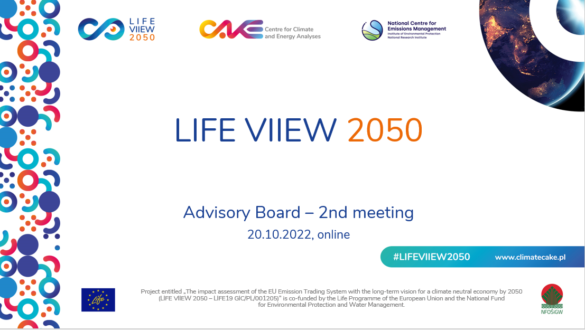
The meeting was chaired by Robert Jeszke, LIFE VIIEW Project Coordinator. Robert Jeszke presented information on the project’s implementation plan, the analyses being prepared, and about the platform of modeling experts, which will be a place to share experiences for the LIFE VIIEW 2050 project. The main goal of the analysis being prepared is to develop scenarios to support policies and measures which would lead to decarbonization in 2050, with the inclusion of EU ETS and non-ETS sectors.
The second LIFE VIIEW 2050 Advisory Board meeting was attended by:
At the main part of the meeting Jakub Boratyński, CGE modelling expert for the LIFE VIIEW 2050 project, gave a presentation on the main modelling ongoing work, including the models used and how they are combined, and the analytical assumptions used in the model scenarios. The meeting was a good opportunity to exchange knowledge, views and perspectives on modeling scenarios, assumptions, information and data.
After the presenatation the substantive discussion with regard to the adopted modelling principles was held which focused mainly:
More information about the LIFE VIIEW 2050 project you can find here: https://climatecake.ios.edu.pl/life-viiew-2050-project/?lang=en
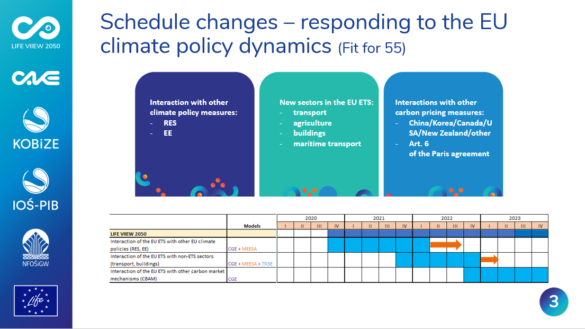
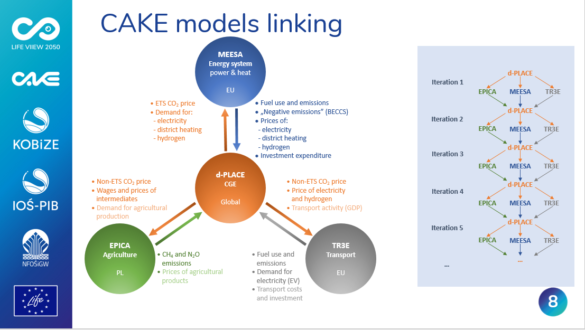

We are pleased to present the latest three CAKE/KOBiZE publications on: energy transition, the role of public transport and the effects of implementing selected instruments mitigating greenhouse gas emissions in agriculture in Poland. These analyses respond to the current challenges which may occur as a result of the implementation of EU climate policy objectives declared in the European Green Deal and the Fit for 55 package presented by the European Commission and the proposed solutions and regulations.
 Polska net-zero 2050. Transformacja sektora energetycznego Polski i UE do 2050 r. (2.3 MiB, 2,596 hits)
Polska net-zero 2050. Transformacja sektora energetycznego Polski i UE do 2050 r. (2.3 MiB, 2,596 hits)
 Poland net-zero 2050. Transformation of the Polish and EU Energy Sector until 2050. Summary. (1.1 MiB, 1,207 hits)
Poland net-zero 2050. Transformation of the Polish and EU Energy Sector until 2050. Summary. (1.1 MiB, 1,207 hits)
 The report shows the directions of energy transformation in energy sector in Poland and EU. The report analyses several scenarios that take into account the challenges of the energy transformation and current fuel crisis:
The report shows the directions of energy transformation in energy sector in Poland and EU. The report analyses several scenarios that take into account the challenges of the energy transformation and current fuel crisis:
 POLSKA NET-ZERO 2050: Rola transportu publicznego w świetle pakietu „Fit for 55” i perspektywy roku 2050. (1.6 MiB, 1,251 hits)
POLSKA NET-ZERO 2050: Rola transportu publicznego w świetle pakietu „Fit for 55” i perspektywy roku 2050. (1.6 MiB, 1,251 hits)
 Poland net-zero 2050. The Role of Public Transport in the context of the “Fit for 55” package to 2050. Summary. (763.9 KiB, 779 hits)
Poland net-zero 2050. The Role of Public Transport in the context of the “Fit for 55” package to 2050. Summary. (763.9 KiB, 779 hits)

In this report we analysed the possible directions of change in the transport sector, with special focus on the role of public transport. We simulated the effects of various scenarios which highlight the challenges that Poland faces in its effort to reduce emission targets in line with EU climate policy.
We analysed the impact of introducing these measures on the transport sector, in particular on the shifts in the structure of the fleet of both individual and public vehicles, the degree of utilisation of zero-emission vehicles and the increase in demand for electricity and hydrogen.
 POLSKA NET-ZERO 2050: Wybrane instrumenty wdrażania polityki klimatycznej w sektorze rolnictwa w perspektywie roku 2050. (1.3 MiB, 1,241 hits)
POLSKA NET-ZERO 2050: Wybrane instrumenty wdrażania polityki klimatycznej w sektorze rolnictwa w perspektywie roku 2050. (1.3 MiB, 1,241 hits)
 Poland net-zero 2050. Selected Instruments for Climate Policy Implementation in Agricultural Sector in the 2050 Perspective. Summary. (647.4 KiB, 644 hits)
Poland net-zero 2050. Selected Instruments for Climate Policy Implementation in Agricultural Sector in the 2050 Perspective. Summary. (647.4 KiB, 644 hits)
 The report analyses the potential for GHG emission reductions in the agricultural sector in Poland in the 2050 perspective under two scenarios:
The report analyses the potential for GHG emission reductions in the agricultural sector in Poland in the 2050 perspective under two scenarios:
Achievement of climate neutrality targets under the given scenarios was assessed under four policy options, namely:
The effects of the implementation of these solutions on the agricultural sector were assessed, including: changes in the area of agricultural land and livestock population, changes in the volume and productivity of agricultural production, prices of agricultural products and changes in farm income, as well as the necessary level of budget expenditures for the implementation of the analysed policy options.

On June 21, 2022, a conference was held in Warsaw entitled „The challenges of transformation in the perspective of achieving the climate neutrality goal of Poland and the European Union by 2050″ organized by Centre for Climate and Energy Analyses (CAKE)/National Centre for Emissions Management (KOBiZE) / Institute of Environmental Protection – National Research Institute (IOS-PIB). Participation in the conference was possible in the form of stationary and online. Link to the event broadcast can be found here.
The main scope of the event includes discussing the challenges of economy transformation in the perspective of achieving the climate neutrality goal by 2050 in Poland and in the European Union. The CAKE’s latest research findings as well as analytical contributions from other stakeholders will serve as the background for this discussion. Panellists will focus on sectoral transformation towards climate neutrality and challenges of energy-intensive sectors and directions of changes in the Polish heating sector in the context of the EU climate policy.
The conference was opened by Mr. Adam Guibourgé-Czetwertyński, Undersecretary of State, Ministry of Climate and Environment, Poland, Mr. Jos Delbeke, European University Institute, EIB Chair on Climate Change Policy and International Carbon Markets) and Mr. Krystian Szczepański, Director, Institute of Environmental Protection – National Research Institute (IOŚ-PIB)
As an introduction, a few words about the current and already completed works under the LIFE Climate CAKE PL project in the context of the challenges of the EU climate policy said Robert Jeszke, Head of the Centre for Climate and Energy Analyses (CAKE) & Strategy, Analysis and Auction Unit (KOBIZE/IOŚ-PIB), Coordinator of LIFE Climate CAKE PL project
The most important part of the conference was devoted to sectoral transformation. At the beginning, main issues concerning The Fit for 55 in the context of the REPowerEU was presented by Tom van Ierland, Head of Unit – Low Carbon
Solutions (I): Montreal Protocol, Clean cooling & Heating, twin transitions, DG Clima, European
Commission.
Later, the results of sectoral analyzes concerning energy, transport and agriculture were presented by CAKE/KOBiZE experts – Maciej Pyrka, Igor Tatatarewicz, Wojciech Rabiega oraz Adam Wąs. This part of the conference ended with presentations on how to finance the transformation (Marcin Jamiołkowski, Deputy Director of External Funds Department in the National Fund for the Environmental Protection and Water Management) and challenges and directions of changes in the Polish heating sector (Zbigniew Kidawa, Director of Sales in the Polish National Energy Conservation Agency (KAPE).
The conference ended with a discussion panel on the challenges of economic transformation in the context of the “fit for 55” package, led by Mr. Robert Tomaszewski, Head of PI Energy, Polityka Insight. The participants of the panel were: Adam Guibourgé-Czetwertyński, Undersecretary of State, Ministry of Climate and Environment, Poland, Liv Rathe, Director Norsk Hydro, Paweł Cioch, Vice-President of PGE, Monika Morawiecka, Regulatory Assistance Project (RAP) Dr inż. Tomasz Zieliński, President of the Board, CEO at Polish Chamber of Chemical Industry (PIPC) oraz Aleksander Rajch, Member of the Management Board Polish Alternative Fuels Association (PSPA).
Below are all presentations from the conference:
 Projekt LIFE Climate CAKE PL w kontekście wyzwań polityki klimatycznej UE (1.8 MiB, 503 hits)
Projekt LIFE Climate CAKE PL w kontekście wyzwań polityki klimatycznej UE (1.8 MiB, 503 hits)
 Poland net-zero 2050: Sectoral transformation towards climate neutrality (3.3 MiB, 481 hits)
Poland net-zero 2050: Sectoral transformation towards climate neutrality (3.3 MiB, 481 hits)
 Prace nad Fit for 55 w kontekście REPowerEU (1.8 MiB, 664 hits)
Prace nad Fit for 55 w kontekście REPowerEU (1.8 MiB, 664 hits)
 Transformacja sektorowa w kierunku neutralności klimatycznej – prezentacja najnowszych wyników analiz CAKE/KOBiZE (1.7 MiB, 534 hits)
Transformacja sektorowa w kierunku neutralności klimatycznej – prezentacja najnowszych wyników analiz CAKE/KOBiZE (1.7 MiB, 534 hits)
 Finansowanie transformacji w kierunku gospodarki nisko i zeroemisyjnej (4.9 MiB, 868 hits)
Finansowanie transformacji w kierunku gospodarki nisko i zeroemisyjnej (4.9 MiB, 868 hits)
 Wyzwania i kierunki zmian w polskim ciepłownictwie na bazie doświadczeń KAPE (2.8 MiB, 875 hits)
Wyzwania i kierunki zmian w polskim ciepłownictwie na bazie doświadczeń KAPE (2.8 MiB, 875 hits)
 PGE - slajdy do panelu (714.7 KiB, 521 hits)
PGE - slajdy do panelu (714.7 KiB, 521 hits)

We would to invite you to participate in conference organized in the framework of the LIFE Climate CAKE PL project „The challenges of transformation in the perspective of achieving the climate neutrality goal of Poland and the European Union by 2050”, organized by the Centre for Climate and Energy Analyses (CAKE), part of the National Centre for Emissions Management (KOBiZE) / Institute of Environmental Protection – National Research Institute (IOS-PIB). The event will take place on the June 21, 2022 from 10.00- 16.30 in site in Warsaw and online.
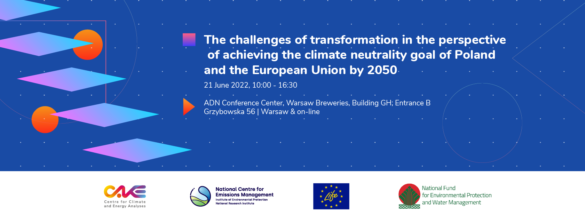
The main scope of the event includes discussing the challenges of economy transformation in the perspective of achieving the climate neutrality goal by 2050 in Poland and in the European Union.
The ambitious mid-century goal of climate neutrality in the European Union, featured in the European Green Deal, has been consistently pursued. Presently, the regulatory Fit for 55 package is being processed as part of the path to this target. This work must go hand in hand with an in-depth impact analysis, finding a way to fairly share efforts, and developing measures to mitigate the impact on the Community citizens.
The CAKE’s latest research findings as well as analytical contributions from other stakeholders will serve as the background for this discussion. We would like to share our views and analytical outcomes, and discuss different ideas and solutions with the stakeholders and experts from different backgrounds. In order to include wide range of stakeholders and views we expect representatives with different perspectives.
For further information, please find attached the draft agenda and the full description of the event.
Participation in the conference is possible in site and/ or online. Simultaneous interpretation will be provided during the conference. The Conference would take place at the ADN Conference Centre,Warsaw Breweries, Grzybowska 56.The link to the conference will be sent to the registered attendees a day before the event.

On 19-20 May 2022, the CAKE team participated in the conference “Inclusive energy transformation and climate protection in cities and municipalities”, organized by the Association of Municipalities Polish Network “Energie Cités”. During the two-day meeting, participants and representatives of over 60 cities and municipalities had the opportunity to both present and exchange experiences in the field of planning the development of its in the context of the challenges of the energy transformation. CAKE representatives had the opportunity to present and share the publication which is one of the main results of the LIFE Climate CAKE PL project – “Polska net – zero 2050. Podręcznik Transformacji Energetycznej dla Samorządów” [“Poland net zero 2050.. Energy transition manual for local governments.”- in Polish].
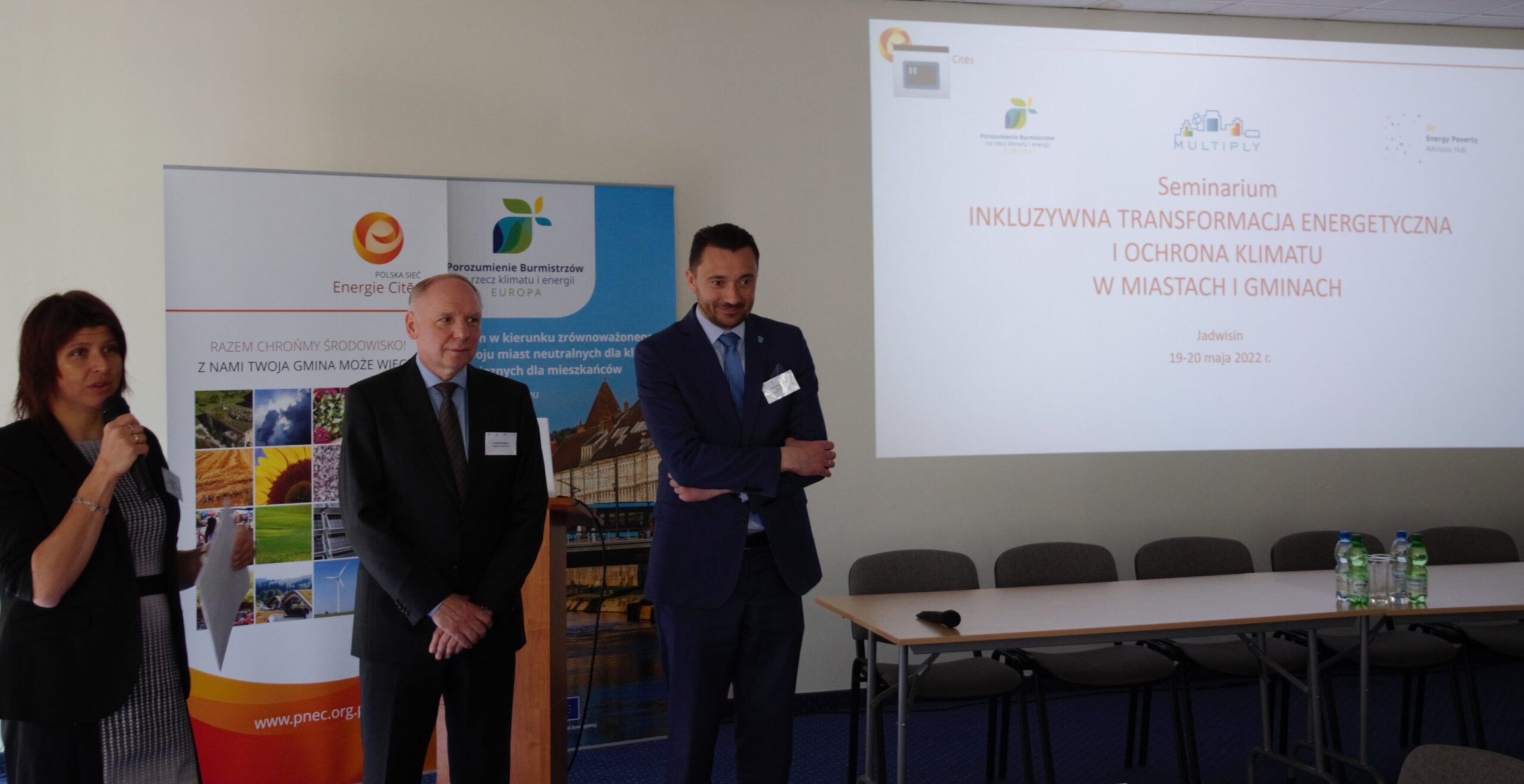
During the first day of the seminar, the meetings were opened by Mr. Artur Borkowski – the mayor of the City and Commune of Serock, and Mr. Leszek Drogosz – President of the Board of the Association of Municipalities Polish Network “Energie Cités” and director of the Infrastructure Office of the City of Warsaw. Of Warsaw, and then Mrs. Anna Jaskuła – director of the PNEC Association “Energie Cités” and started the first part of the seminar on sustainable city management in the context of new energy and social challenges.
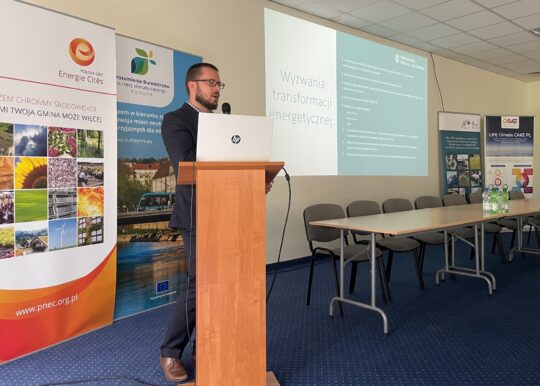
In the first part of the meeting, Mr. Paweł Różycki, Deputy Director of the Department of Strategy and Analyzes, Ministry of Climate and Environment, gave a presentation entitled “Poland’s climate and energy policy in the context of new energy, geopolitical and social challenges”, where he discussed the most important challenges related to the energy transformation and the pursuit of climate neutrality in Poland, as well as related to, inter alia, the current situation in the world and the limited availability of fuels on international markets, or high prices of fossil fuels. During his speech, he also presented the assumptions for updating the document “State energy policy 2040” (PEP 2040), where, apart from the existing pillars, I. Just transition, II. Zero-emission energy system, III. Good air quality, the new fourth pillar is to be “Energy Sovereignty”.
Ms Anna Czyżewska from the Department of Climate Change Adaptation, National Fund for Environmental Protection and Water Management (NFOŚiGW) showed a presentation entitled “Financing of tasks in the field of adaptation to climate change by the National Fund for Environmental Protection and Water Management”, where she presented the possibilities of financing activities from various programs, i.e. the priority program “Adaptation to climate change and reducing the effects of environmental threats”, or the priority program “Climate spas”, as well as the possibilities of financing activities from the Operational Program Infrastructure and Environment (OPI & E 2014-2021) where under Measure 2.1: “Adaptation to climate change along with securing and increasing resistance to natural disasters, in particular natural disasters and environmental monitoring”, a number of investments related to water management are implemented.
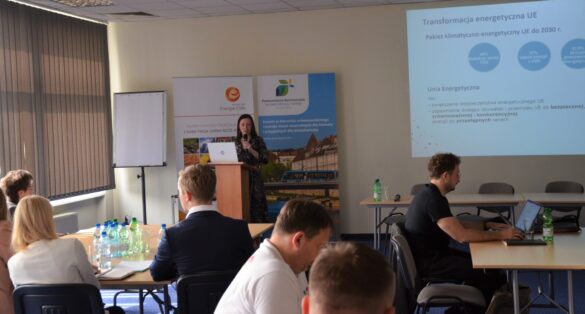
Ms Iwona Korohoda – Project Manager Association of Municipalities Polish Network “Energie Cités” gave a presentation entitled “Covenant of Mayors and support of European institutions for local governments – leaders of the energy transformation in Poland”, during which she discussed the Covenant of Mayors for climate and energy initiative and support of European institutions for local governments – in this regard. Ms Patrycja Płonka, Project Manager, Association of Municipalities Polish Network “Energie Cités” – presented a presentation entitled “Integrated city planning as a tool to reduce energy consumption and greenhouse gas emissions from the city (MULTIPLY project)”.
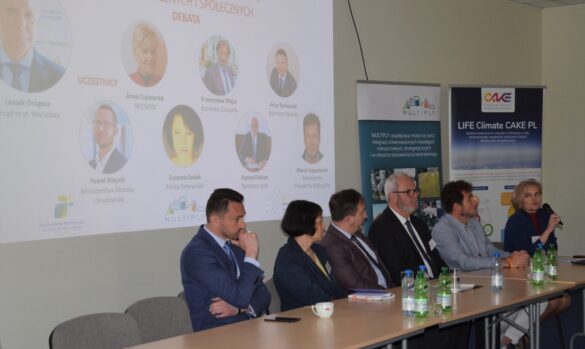
Representatives of local governments and cities participated in the debate on planning the future and development of cities and communes in the field of energy transformation and municipalities, as well as on behalf of the National Fund for Environmental Protection and Water Management and the Polish Green Network. The results of the talks emphasized that local governments face many energy challenges, and the transformation to low-emission, despite the support provided, is a huge burden due to the need to incur high own contribution (even with co-financing from NFEPWM programs), uncertainty related to new legal solutions and competition in the labor market.
In presentations of activities undertaken by local governments, Mr. Tomasz Skoczylas, director of the Urban Innovation Center – Urban Lab from the city of Rzeszów showed how to establish positive cooperation and involve citizens in cooperation with the city authorities, Mr. Tomasz Bońdos from the Bydgoszcz City Hall presented a systemic approach to optimization energy production and consumption in the city, and Mr. Bartosz Stachowiak from the Economic and Social Department of the UKSW showed what are the possibilities of using hydrogen in public and private transport.
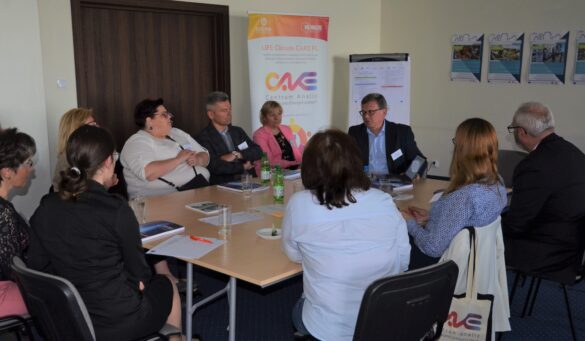 During the table session, the participants of the meeting had the opportunity to see the achievements of LIFE Climate CAKE PL, where Mr. Maciej Cygler, CAKE Expert presented a presentation entitled “Energy transformation of cities and municipalities”, during which he presented the results of CAKE’s work and the “Polska net – zero 2050. Podręcznik transformacji energetycznej dla Samorządów.” prepared as a result of our work. The session was very popular among the participants and gathered many representatives of local governments who welcomed the results of the work performed by CAKE. During this session, participants also had the opportunity to discuss and learn about the experiences of representatives from the business sector, including from PMG Sp. z o.o. on sustainable transport in the city and Pomorska Grupa Konsultingowa S.A. on actions taken for sustainable energy management, as well as on the legal conditions for establishing energy cooperatives in Poland.
During the table session, the participants of the meeting had the opportunity to see the achievements of LIFE Climate CAKE PL, where Mr. Maciej Cygler, CAKE Expert presented a presentation entitled “Energy transformation of cities and municipalities”, during which he presented the results of CAKE’s work and the “Polska net – zero 2050. Podręcznik transformacji energetycznej dla Samorządów.” prepared as a result of our work. The session was very popular among the participants and gathered many representatives of local governments who welcomed the results of the work performed by CAKE. During this session, participants also had the opportunity to discuss and learn about the experiences of representatives from the business sector, including from PMG Sp. z o.o. on sustainable transport in the city and Pomorska Grupa Konsultingowa S.A. on actions taken for sustainable energy management, as well as on the legal conditions for establishing energy cooperatives in Poland.
During the second day of the seminar, presentations were given and topics related to counteracting energy poverty were discussed. Ms Patrycja Płonka, the Energy Cities gave a presentation entitled “The role of local governments in the protection of vulnerable consumers and shaping conscious energy attitudes”, and Mr. Jakub Sokołowski (IBS) gave a presentation on “Diagonosis of the problem of energy poverty in the commune”, and Mrs. Anna Fijas from the Energy Cities Association on “From diagnosis to action – tools at the disposal of local governments and examples of good practice “. Mr. Piotr Sołtysek from Bielsko-Biała talked about shaping active civic attitudes and involving residents in the implementation of local climate and energy goals. During the table session, Mr. Jerzy Tymczyszyn from Raciechowice informed about the role of eco-managers and activities aimed at involving residents in the implementation of local climate policy. Ms. Eliza Bujalska, the mayor of Mińsk Mazowiecki shared her experiences from the Human Smart City project, and Mr. Przemysław Major, the mayor of Cieszyn, talked about social consultations on the development of the city, conducted under the slogan “Let’s talk about Cieszyn”.
During the two-day seminar, CAKE experts, apart from participating in the seminar and discussions with a number of local government representatives, informed about the results of work and activities undertaken by our CAKE Team in the field of energy transformation, which could be useful in the work of local governments, and had the opportunity to provide representatives of local authorities with a number of publications and brochures made as part of our LIFE Climate CAKE PL project.
More information and a full report can be found on the PNEC website: http://www.pnec.org.pl/pl/3-aktualnoci-kat/859-inklusivena-transformacja-energetyczna-seminarium-w-jadwisinie-2022